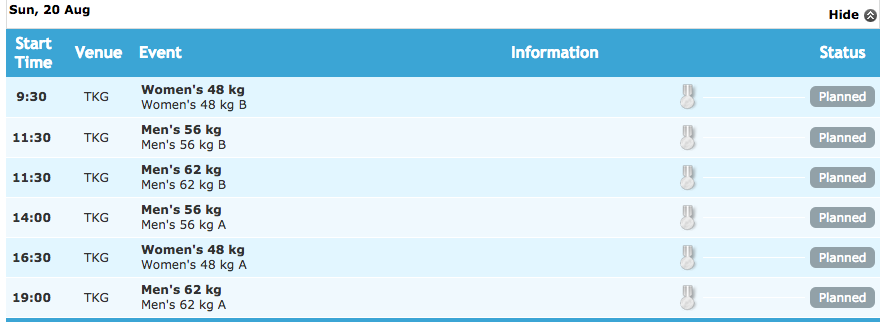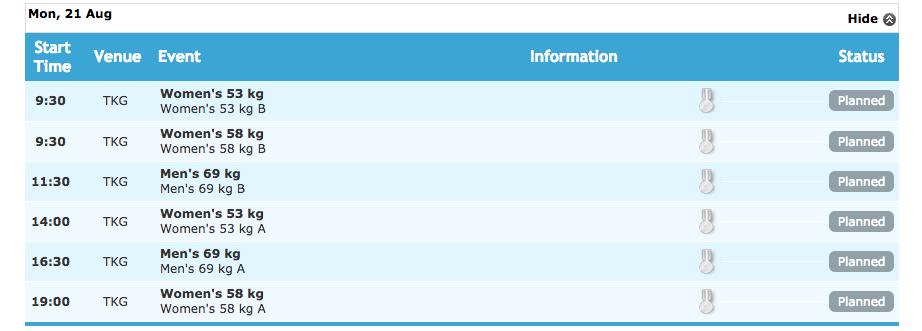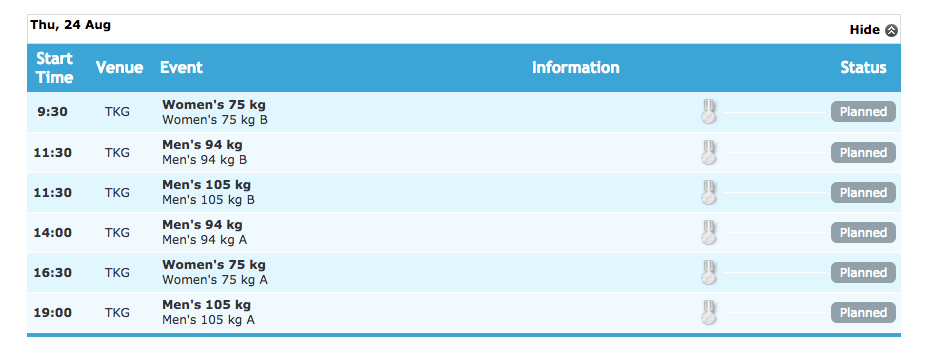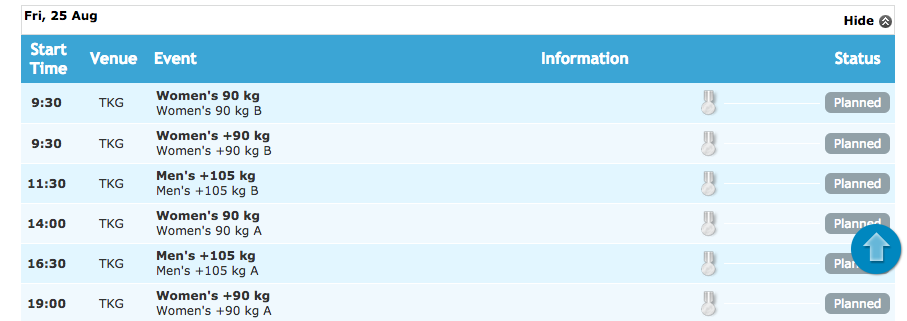On Saturday, August 19th, the 29th Summer Universiade begins in Taipei, Taiwan. This event lasts 13 days, involves over 120 countries, and includes 22 sports. The event is put on by the International University Sport Federation every two years, and this year, the United States is sending 16 weightlifters, 8 male and 8 female.
In preparation for the competition, the members of Team USA has been focused on balancing their academic course load and their training. As a requirement for eligibility, athletes must be age 28 or younger and have taken at least one three credit course towards a degree within the past year. Athletes were selected by USA Weightlifting based off their totals in either the 2016 American Open, 2016 Junior National Championships, 2016 American Open Series 1, or the 2017 University Nationals/Under 25 Championships.
https://www.instagram.com/p/BWY2uWwg__6
Perhaps none have had as difficult a balancing act as Andrew Cheung (56kg), who has been preparing to compete while completing his residency with an inpatient adult medicine rotation. He explains, “I took care of acutely ill and hospitalized patients for three weeks, working 12-hour days, 6 days a week, and somehow fit training into my schedule. The job is physically, intellectually, and emotionally demanding, so it can be very difficult to find the time and energy to get to the gym and prepare. Nonetheless, the desire to perform on the international stage has been driving me through.”
As if academics were not enough of a challenge, several of Team USA’s lifters have also been battling injuries in the months leading up to the Universiades. Darren Barnes (56kg), Christian Rodriguez-Ocasio (85kg), and Kristin Pope (63kg) have all made adjustments to their training regimens to circumvent injuries they are contending with. Barnes explains, “Training for the Universiade has been one of the most difficult cycles ever. Leading up to University Nationals, I had just come back from an eight month break due to a shoulder labral tear that occurred during the 2016 Senior Nationals/Olympic Trials. Training then got more technical in order to prevent further injury.” Barnes has only been able to train three to four days per week, but approaching his training from a technical standpoint has allowed him to snatch 110kg and clean and jerk 140kg in training.
Christian Rodriguez-Ocasio has been dealing with a sprained ULC (ulnar lateral ligament in the elbow) that he suffered during a 143kg snatch attempt. As a result, his main focus for this cycle has been to be as healthy as possible. His coach, Dr. Satoshi Mizuguchi, decided that physical therapy was of primary importance and because of that, Rodriguez-Ocasio says, “Peaking for this meet is the opposite of what I am used to. We are increasing the load as we get closer to the meet which allowed my UCL more time to recover.” Though it’s is an unorthodox approach to peaking, his coach believes it’s the right one constantly telling Rodriguez-Ocasio, “You have good technique and a lot of strength. We just have to play it safe.”
https://www.instagram.com/p/BXBM4DwB0BG
Kristin Pope has also been working through injury to prepare for the Universiades. A labral tear in her hip has plagued her training, but Pope has not let it hold her back. She eliminated back squats as they created too much pressure in her hip, and substituted with front squats which she found to be a better alternative. She says, “I can’t put too much strain on my hip with a ton of squatting, so I have pushed hard in the areas that I can.” Those areas include increasing her volume and focusing on her receiving position in the snatch, “landing in the legs” on her clean to catch the bounce, and drilling her footwork for the jerk. She also decided to start work with 1972 Olympic Gold Medalist Zygmund Smalcerz, who was formerly USA Weightlifting’s United States Olympic Training Center resident team coach. Pope says, “He has been great about adjusting things for me and working with me to make sure I can get into top condition and peak for the meet.”
https://www.instagram.com/p/BVLdBDgjH_a
Other athletes, like Danielle Hudes (69kg), have focused mostly on changing their mentality during their last training cycle. Unhappy with her performances at the last two national meets, Hudes believes that removing the pressure she felt and finding a way to enjoy the process would lead to a better outcome. She explains, “Being my first international meet, I knew there would be many factors out of my control- like not having Mike (McKenna- her coach) or Laura (Mohler- her girlfriend) with me, eating different food in Taipei, having more nerves, and doing a lot of traveling, so I feel like having trust and confidence in myself and my lifting is most important.” In an effort to build this confidence and positive mentality, Hudes has approached each training session with focus on making every lift. She says, “I have been trying to ‘own’ them- trying to go after them instead of trying not to miss.” Hudes expects this change in mentality will not only help her perform her best at Universiades, but also allow her to enjoy the experience of competing as a part of Team USA.
Cheung also believes his mentality will allow him to perform at his best. He says, “When I get onto the platform, it’s almost as though there is no one else around. So whether it’s a local meet or an international competition, my mental approach is largely the same.” He hopes that tapping into this mindset on the platform will enable him to reach his goal of representing the United States well.
In fact, all of the athletes interviewed spoke about wanting to contribute to the team’s effort at the Universiades. Pope explained that while she would like to increase her total like she’s managed to do in each meet leading up to Universiades, ultimately, she’s “not too focused on an end goal number” and says, “I just want to nail my lifts and earn as many points for USA [toward their overall standing in the Universiade] as possible.”
Christian Rodriguez-Ocasio mirrors this sentiment. He feels doing what is best for Team USA is more important than attempting a personal record. He explains that he wants to do “whatever is necessary for the team to do well. If achieving a medal or scoring points for USA requires going for a personal record, then I will gladly go for it. But personal records are not my goal at this moment.” Instead, he hopes to compete pain free and to earn points for Team USA.
https://www.instagram.com/p/BXeambYAqdx
In order perform well for the country, the athletes will have to do their best to adjust to a new time zone. To do this, Darren Barnes intends to stay awake throughout the flight, arriving on the 18th at 7pm. To prevent himself from falling asleep, he will work out when he arrives. He will train again early the next day to prepare his body for competing in Taipei.
Recovering from the flight is also important. Pope is wary about the effects 20 hours of total travel time might have on her body, but plans to hydrate throughout the flight to counter the effects.
Like Pope, Rodriguez-Ocasio has a plan for staying healthy and focused in Taipei. He keeps to himself during competitions so that he can rest and relaxes by the pool to stay calm. Keeping this clear head is vital to optimal performance at the Universiades. Hudes agrees explaining that when she gets anxious, she reminds herself to just be in the moment so that she can appreciate being on the international stage and allow her body to perform.
And of course, each athlete will enjoy the opportunity that they have earned. As Cheung explains, one simply can’t “go to Taiwan and not have some beef noodle soup or visit the night markets.” Danielle Hudes agrees, “We will be there 10 days as a team and so I will definitely see some of Taiwan and am excited to do so!”
The Universiade’s Weightlifting schedule is posted below (images courtesy of International University Sports Federation). All times are listed in CST- China Standard Time. To watch, tune into the live feed at http://www.livefisu.tv/

Editor’s notes: BarBend is the Official Media Partner of USA Weightlifting. Beyond article syndication, the two organizations maintain editorial independence.
This article is an op-ed. The views expressed herein and in the video are the authors and don’t necessarily reflect the views of BarBend. Claims, assertions, opinions, and quotes have been sourced exclusively by the author.
Featured image: @sonic.do on Instagram




